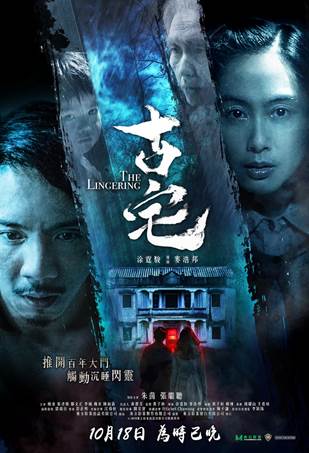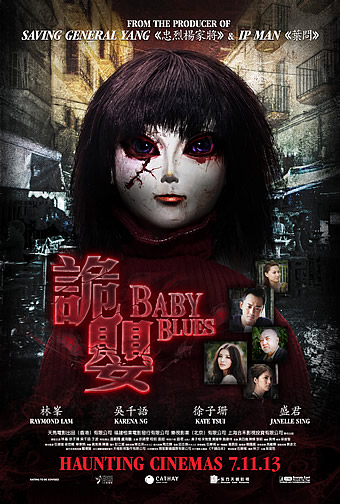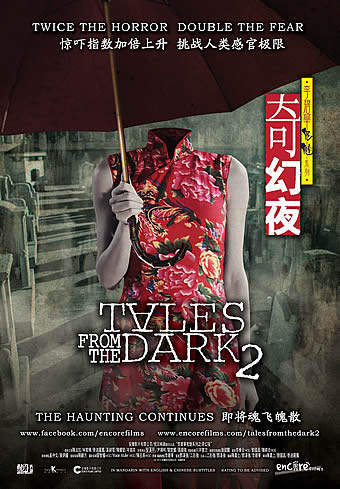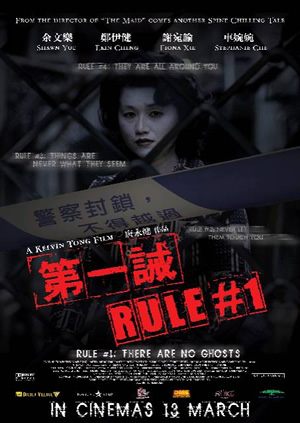LUCID DREAMS (喜, 怒, 哀, 乐) (2018)
Genre: Horror/Thriller
Director:Teddy Robin
Cast: Stephy Tang, Louis Cheung, Kevin Cheng, Dada Chan
Runtime: 1 hr 31 mins
Rating: PG13 (Horror)
Released By: Shaw Organisation
Official Website:
Opening Day: 1 November 2018
Synopsis: The movie is about four of the director’s dreams: Don wanted to repay his debt by holding a fake wedding; white collar Fan learned how to let go of his ego after his struggle in love and work; writer Tong reunited with her long-lost mother but their love could not be continued; coach driver Chung was inspired by four ‘ghost ladies’ and became confident again about his talent in music.
Movie Review:
Four short stories titled ‘Happiness’, ‘Wrath’, ‘Sorrow’ and ‘Joy’ make up this tonally uneven horror-comedy anthology, which are wholly unrelated except for the fact that they belong in the mind of director Teddy Robin Kwan. Playing a fictional version of himself in the film, Teddy is seen at the start musing about the resemblance between a dream and a movie, and whether it is the director who is in control of the dream or if it is the dream that is in control of the director. Frankly, the philosophical mambo-jumbo is just a bunch of nonsense; ditto the argument that Teddy has with his producer, before a freak accident on the set of his latest movie renders him unconscious and triggers the quartet of dream narratives.
‘Happiness’ sees Louis Cheung play a small-time gangster Tung, who conspires with his associate Sai Gai (Wan Chiu) and a prostitute Dada (Dada Chan) to stage a fake wedding on a building rooftop, in order to trick his relatives of their ‘ang pows’ to pay off his debts. Their scam goes on without a hitch until after they set off a fire to chase all their guests off the roof, when Tung picks up a call on Dada’s phone that is from the hospital, informing the one in possession of the device that its owner had passed away just hours earlier. There are some further abrupt surprises within the story, most crucially involving Tung’s grandmother (Susan Shaw), but by simply being the most coherent, this is unquestionably the best segment of the four.
Kevin Cheng’s ‘Wrath’ follows, which sees him play an office worker Chun who seethes under the verbal abuse of his boss Jin (Tony Ho). After staying late one night to set up for a meeting the next day, Chun runs into a hobo at the underpass and is given a bag of seeds which the latter says will change his luck. Alas, Chun returns to the office the next day to find that his girlfriend Cherry, who works in the same office, had stabbed Jin in the neck after he had tried to rape her. Just like that, the story culminates in a showdown at Chun’s apartment that same evening, where both Cherry and Jin suddenly decide to show up. Yet by the time it ends, you’ll be left wondering what to make of Chun, or for that matter, this pointless story about pent-up anger.
On the other hand, the next story ‘Sorrow’ tries to cram too much plot at one go. This is also the episode which has made headlines about Stephy Tang baring her back for the first time, but those expecting anything sensual best not harbour any such expectation. Tang plays an illustrator who moves back to the family mansion she grew up in as a child, after finding out that her husband is having an extramarital affair, not least on her birthday. What follows involves not just her husband but also her mother, who had gone missing after a fire in the same mansion years ago that claimed the life of her father. There is more than one tragedy at play here, but the sheer haste at which the movie goes through these events diminishes their emotional poignancy. Plot-wise, there are some curious similarities with the recently released ‘The Lingering’, which though certainly longer is not necessarily better executed.
Last but not least is the thinnest one of them all, which sees Andrew Lam play a bus driver named Ah Chung, who is asked by his boss to ply a new bus route that runs to the supposedly haunted East Town Theatre. En route, Ah Chung has run-ins with a couple of spooky passengers, but these individuals turn out to be no more than cosplayers on their way to the theatre to participate in a musical. Oh yes, this final story is played for laughs more than anything, and with Ah Chung and his passengers walking into the theatre where Teddy happens to be seated, meant to bring the whole movie to a close. Even as closure though, it is too inconsequential to justify its very existence, and underscores the general futility of these stories.
Indeed, we’re not quite sure what was the point of this exercise, or if there was a point to be made in the first place. Perhaps Teddy and his co-writer Ng Ho-yin has a germ of four ideas in their head, and not knowing how to develop each of these, decided simply to just string them together with a pretentious meta- overlay. Either way, hardly any of the stories seem properly developed, or for that matter the very concept of presenting them as dreams within a director’s mind. It does prove one thing though – whether on film or in reality, the inner workings of Teddy Robin Kwan may be minimally lucid, but they aren’t exactly coherent, well thought-out or even sensible.
Movie Rating:


(Four largely pointless horror stories strung together with a pretentious meta- overlay - that about describes how lucid this pointless exercise is)
Review by Gabriel Chong
You might also like:





